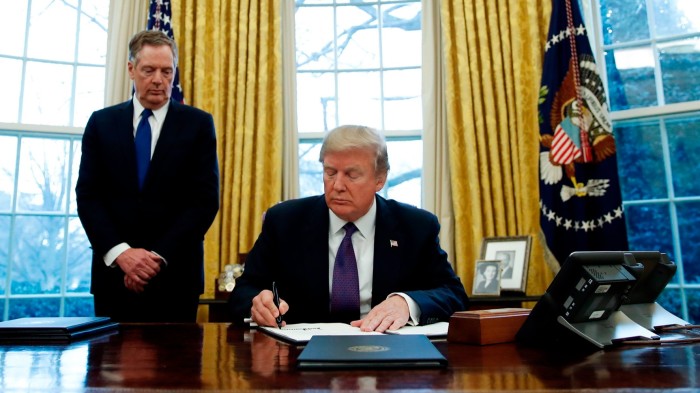Unlock the White House Watch newsletter for free
Your guide to what the 2024 US election means for Washington and the world
When Joe Biden departs the White House and Donald Trump re-enters, America’s trading partners fear the US will distort commerce with high import tariffs, treat World Trade Organization rules with open contempt and use threats of trade restrictions to force them to follow the US lead.
“No change there” would be an exaggeration, but not a grotesque one.
The standard view is that recent years have seen the decay of a US-led postwar order in which world trade was governed by a rules-based legal and political framework. The decline, the story goes, rapidly accelerated under the first Trump administration and only slightly recovered under Joe Biden.
In reality, that’s too positive about the state of grace before the Trumpian fall. You can make a pretty good case that, adapting Mahatma Gandhi’s observation about western civilisation, the thing about a multilateralist trading order anchored by Washington is that it would have been a very good idea.
Before the creation of the WTO itself in 1995, the rules were embedded in a treaty, the General Agreement on Tariffs and Trade, essentially run by a small cold war club of allied rich countries. Dispute settlement wasn’t binding. The US was dominant. It was a club of equals in the way Nato is.
The US started losing patience with true multilateralism as soon as it was tried, disapproving of the Appellate Body (AB) of the WTO dispute settlement system for its expansive interpretations of the rules. The US was also often reluctant to comply with rulings, a scofflaw as well as a sheriff. It spent a decade ducking a landmark ruling in Brazil’s favour against US cotton subsidies before simply paying off the Brazilians rather than reforming its trade-distorting payouts.
The US moved away from multilateralism under George W Bush towards creating a preferential system, launching the Trans-Pacific Partnership in the Asia-Pacific region, a project later pursued by Barack Obama’s administration. But even before Trump withdrew the US from TPP, Congress had blocked it and Hillary Clinton disowned it in her 2016 presidential election campaign.
Now the fun really starts. Enter the Trump administration with WTO-sceptic Robert Lighthizer, whose own nomination to join the AB had been rejected, as trade representative. The Trump administration hobbled the WTO dispute settlement by refusing to reappoint judges to the AB.
When Biden was elected, his administration talked a good multilateralist game but other member governments increasingly regarded it as being in bad faith. True, it did participate in WTO talks on various subjects, but they created nothing of substance.
Yet the Biden White House continued to stymie the AB, forcing other governments to use an ersatz workaround version, and treated WTO rules with broad indifference. The rationale changed but the effect was similar. Trump ignored WTO rules for purely protectionist reasons, Biden because they stood in the way of the subsidies and tariffs of his expansive green industrial interventions.
In his second term, Trump might well simply continue to treat the WTO with malign neglect rather than actively trying to destroy it. There’s an early test with the coming reappointment of WTO director-general Ngozi Okonjo-Iweala, whose selection Lighthizer initially blocked the first time round.
In reality the main danger from Trump will come from his threatened unilateral tariffs, not just the direct distortions to world trade but what other governments will do to avoid them. The evasive manoeuvres during Trump’s first term were already legally dicey: quotas on steel imports from Japan, a proposed bilateral deal on industrial goods violating the EU’s own rules.
If Trump decides other countries have to join the US in whacking big unilateral tariffs on China or face reprisals, the collateral damage could be much more serious. It’s not just the US ignoring international law but dragging trading partners along with it.
Again, this would not entirely be a novelty. The Biden administration attempted (though failed) to bully the EU into putting almost certainly WTO-illegal steel tariffs on imports from China. It also successfully leaned on Canada to impose 100 per cent tariffs on electric vehicles from China and consider a ban on Chinese software in connected cars. But under Trump II the pressure is likely to be an order of magnitude greater, and governments will have to decide how far they will follow rules-based principles at the cost of Trump’s wrath.
There are a few positive things they can do to bolster the system. The EU and Mercosur, the South American trading bloc, for example, could finalise a long-awaited trade deal in the coming weeks. That would be a useful signal that the rules-based flame continues to flicker in the Trumpian darkness. Otherwise, as ever, they will be relying on their companies to keep production networks going despite official impediments.
The reality is that the multilateral system has been sufficiently weakened by US disapproval over the decades that it’s not promising much resistance even before Trump starts his work. Mutterings of disquiet from Washington right from the creation of the WTO have gradually become deep rumbles of discontent that have shaken the institution’s foundations. Even if Trump does not dispatch a wrecking ball, the edifice of multilateralism has progressively crumbled away.
